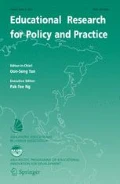Abstract
The study examined the process of policy implementation of lifelong learning for the elderly in Thailand, covering four main regions within the country. The study empirically compared inputs, processes, outputs, and outcomes of policy implementation in the north, south, northeast, and central regions of Thailand and captured the rigor of policy implementation. Using qualitative research methodology, the study showed that each region had established a networking model among stakeholders differently, with distinct actors as focal points in promoting the policy. North and south were the two regions where the elderly were most active and had contributed substantially in terms of inputs. They had also steered the process of policy implementation through close collaboration with sub-district administrative offices and the establishment of their respective associations for the elderly. The other two regions depended on support from the central government and regional branch of the office of non-formal and informal education. The sharp contrast between the regions led to the conclusion that the direction and pro-activeness in promoting lifelong learning policy for the elderly people in Thailand yielded different policy outputs and outcomes; that policy outputs and outcomes remained at the discretion of key actors within each locality; and that policy output and outcome were also not completely dependent on the top-down direction provided by the national government.





Similar content being viewed by others
References
Bourn, D. (2001). Global perspectives in lifelong learning. Research in Post-Compulsory Education, 6(3), 325–338.
Connolly, B. (2008). Adult learning in groups. Glasgow: Bell and Bain Ltd.
Dhirathiti, N. (2014). Lifelong learning policy for the elderly people: A comparative experience between Japan and Thailand. International Journal of Lifelong Education, 33(6), 770–790.
Easton, D. (1957). An approach to the analysis of political systems. World Politics, 9(3), 383–400.
European Commission. (2001). Making a European area of lifelong learning a reality. Brussels: European Commission.
European Commission. (2007). The key competences for lifelong learning—A European framework. Luxembourg: Office for Official Publications of the European Communities, Belgium.
Foundation of Thai Gerontology Research and Development. (2009). Report of the elderly situation. Bangkok: TGRD.
Fuwa, K. (2009). Is the expansion of higher education in Japan for young students only or for all? A critical analysis from a lifelong learning perspective. International Journal of Lifelong Education, 28(4), 459–471.
Hargreaves, D. H. (2004). Learning for life: The foundations for lifelong learning. Bristol: Policy Press.
Henry, N. (2010). Public administration and public affairs (11th ed.). New York: Longman.
Human Security Commission. (2003). Human security now. New York: United Nations.
Jakobi, A. P. (2009). International organizations and lifelong learning: From global agendas to policy diffusion. New York: Palgrave Macmillan.
Jarvis, P. (2008). Democracy, lifelong learning and the learning society: Active citizenship in a late modern age (1st ed.). New York: Taylor & Francis.
Kawachi, P. (2008). Education reform for Japan for lifelong learning. International Journal of Lifelong Education, 27(5), 509–516.
Kennedy, K., & Li, Z. (2008). The changing role of schools in Asian societies: Schools for the knowledge society. New York: Routledge.
Knowles, M. S., Holton, E. F., & Swanson, R. A. (2005). The adult learner: The definitive classic in adult education and human resource development (6th ed.). Amsterdam: Elsevier.
Longworth, N. (2003). Lifelong learning in action: Transforming education in the 21st century. Virginia: Kogan Page.
Ministry of Education (Thailand). (2009). Rationale and ideas for implementation of ONIE: ONIE Handbook. Bangkok: ONIE.
Ministry of Education (Thailand). (2012). Lifelong Learning Policy. http://www.moe.go.th/moe/th/news/detail.php?NewsID=28439&Key=hotnews. Retrieved on 15 January 2016.
MEXT. (2008). Basic plan for the promotion of education. Tokyo: MEXT.
MEXT. (2014). Summary of lifelong learning policy. Tokyo: MEXT.
Nyyssold, K., & Hämäläinen, K. (2001). Lifelong learning in Finland: The extent to which vocational education and training policy is nurturing lifelong learning in Finland. Helsinki: European Centre for the Development of Vocational Training, Thessaloniki (Greece), Finnish National Board of General Education.
Ogden, A. C. (2010). A brief overview of lifelong learning in Japan. The Language Teacher, 34(6), 5–13.
Okumoto, K. (2008). Lifelong learning in England and Japan: Three translations. Compare: A Journal of Comparative and International Education, 38(2), 173–188.
Pradab, R. (2013). Community organizations council: New politics and challenges to local elite groups. Bangkok: King Prajadhipok’s Institute.
Rubenson, K. (2011). Adult learning and education. London: Academic.
Tikkanen, T., & Nyhan, B. (2006). Promoting lifelong learning for older workers: An international overview. Luxembourg: Office for Official Publications of the European Communities.
TGRI. (2015). Situation of the Thai Elderly 2015. Bangkok: Foundation of Thai Gerontology Research and Development Institute.
UNESCO. (1996). Learning: The treasure within—Report to UNESCO of the international commission on education for the twenty-first century. Paris: UNESCO.
Weinstein, C. E., & Hume, L. M. (1998). Study strategies for lifelong learning (1st ed.). Washington: American Psychological Association.
Author information
Authors and Affiliations
Corresponding author
Additional information
This work was supported by the Thailand Research Fund under the Project on Trends and Development of Lifelong Learning Policy for Elderly People in Thailand (Grant RDG5740036).
Rights and permissions
About this article
Cite this article
Dhirathiti, N.S., Pichitpatja, P. Characteristics and differences of lifelong learning policy implementation for the elderly in Thailand. Educ Res Policy Prac 17, 53–68 (2018). https://doi.org/10.1007/s10671-017-9219-x
Received:
Accepted:
Published:
Issue Date:
DOI: https://doi.org/10.1007/s10671-017-9219-x




